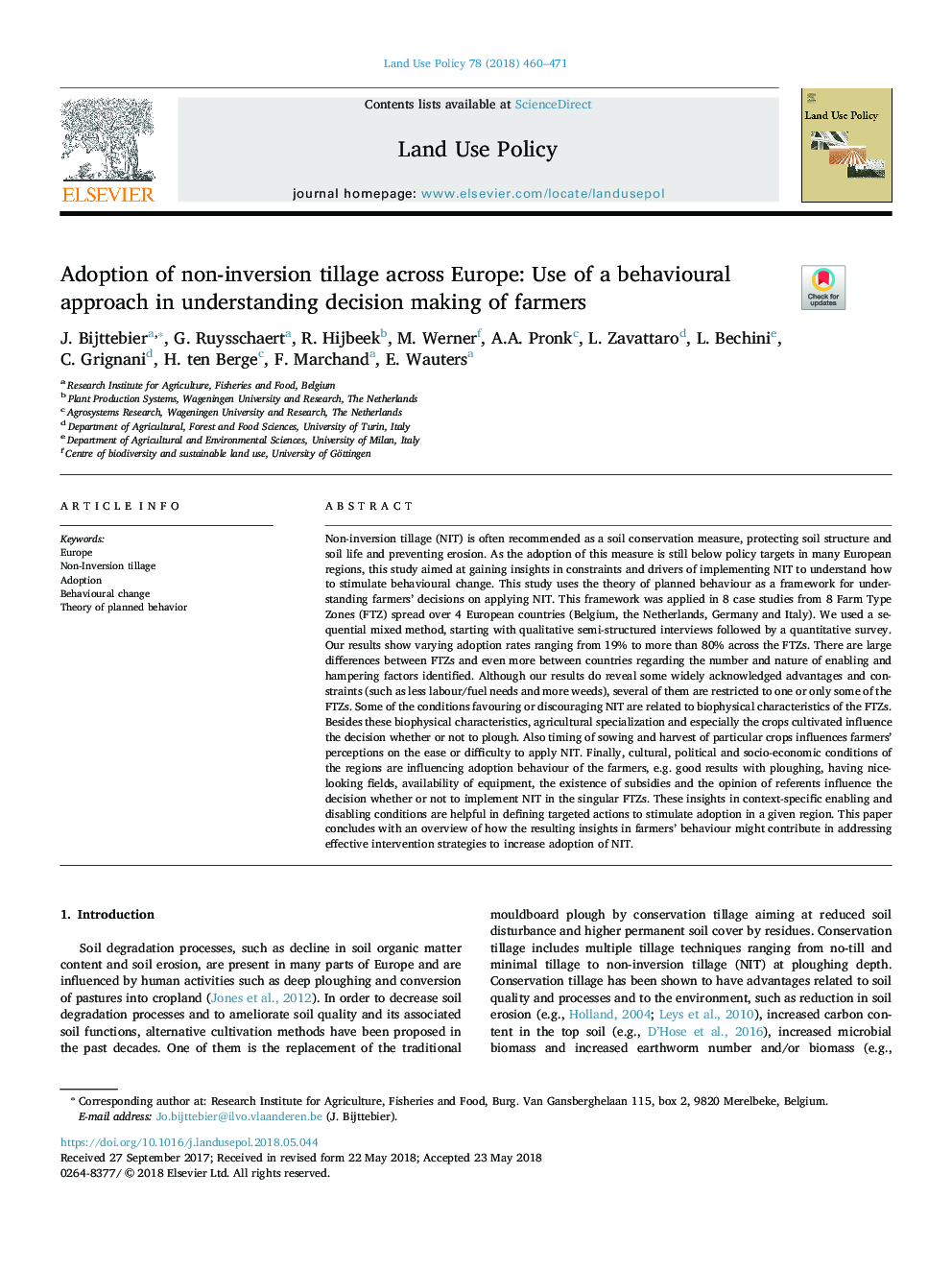| کد مقاله | کد نشریه | سال انتشار | مقاله انگلیسی | نسخه تمام متن |
|---|---|---|---|---|
| 6546057 | 1421805 | 2018 | 12 صفحه PDF | دانلود رایگان |
عنوان انگلیسی مقاله ISI
Adoption of non-inversion tillage across Europe: Use of a behavioural approach in understanding decision making of farmers
ترجمه فارسی عنوان
تصویب خاکستر غوطه ور در سراسر اروپا: استفاده از رویکرد رفتاری در درک تصمیم گیری کشاورزان
دانلود مقاله + سفارش ترجمه
دانلود مقاله ISI انگلیسی
رایگان برای ایرانیان
کلمات کلیدی
اروپا، خاکورزی غیر انسانی، تصویب، تغییر رفتاری، نظریه رفتار برنامه ریزی شده،
موضوعات مرتبط
علوم زیستی و بیوفناوری
علوم کشاورزی و بیولوژیک
جنگلداری
چکیده انگلیسی
Non-inversion tillage (NIT) is often recommended as a soil conservation measure, protecting soil structure and soil life and preventing erosion. As the adoption of this measure is still below policy targets in many European regions, this study aimed at gaining insights in constraints and drivers of implementing NIT to understand how to stimulate behavioural change. This study uses the theory of planned behaviour as a framework for understanding farmers' decisions on applying NIT. This framework was applied in 8 case studies from 8 Farm Type Zones (FTZ) spread over 4 European countries (Belgium, the Netherlands, Germany and Italy). We used a sequential mixed method, starting with qualitative semi-structured interviews followed by a quantitative survey. Our results show varying adoption rates ranging from 19% to more than 80% across the FTZs. There are large differences between FTZs and even more between countries regarding the number and nature of enabling and hampering factors identified. Although our results do reveal some widely acknowledged advantages and constraints (such as less labour/fuel needs and more weeds), several of them are restricted to one or only some of the FTZs. Some of the conditions favouring or discouraging NIT are related to biophysical characteristics of the FTZs. Besides these biophysical characteristics, agricultural specialization and especially the crops cultivated influence the decision whether or not to plough. Also timing of sowing and harvest of particular crops influences farmers' perceptions on the ease or difficulty to apply NIT. Finally, cultural, political and socio-economic conditions of the regions are influencing adoption behaviour of the farmers, e.g. good results with ploughing, having nice-looking fields, availability of equipment, the existence of subsidies and the opinion of referents influence the decision whether or not to implement NIT in the singular FTZs. These insights in context-specific enabling and disabling conditions are helpful in defining targeted actions to stimulate adoption in a given region. This paper concludes with an overview of how the resulting insights in farmers' behaviour might contribute in addressing effective intervention strategies to increase adoption of NIT.
ناشر
Database: Elsevier - ScienceDirect (ساینس دایرکت)
Journal: Land Use Policy - Volume 78, November 2018, Pages 460-471
Journal: Land Use Policy - Volume 78, November 2018, Pages 460-471
نویسندگان
J. Bijttebier, G. Ruysschaert, R. Hijbeek, M. Werner, A.A. Pronk, L. Zavattaro, L. Bechini, C. Grignani, H. ten Berge, F. Marchand, E. Wauters,
